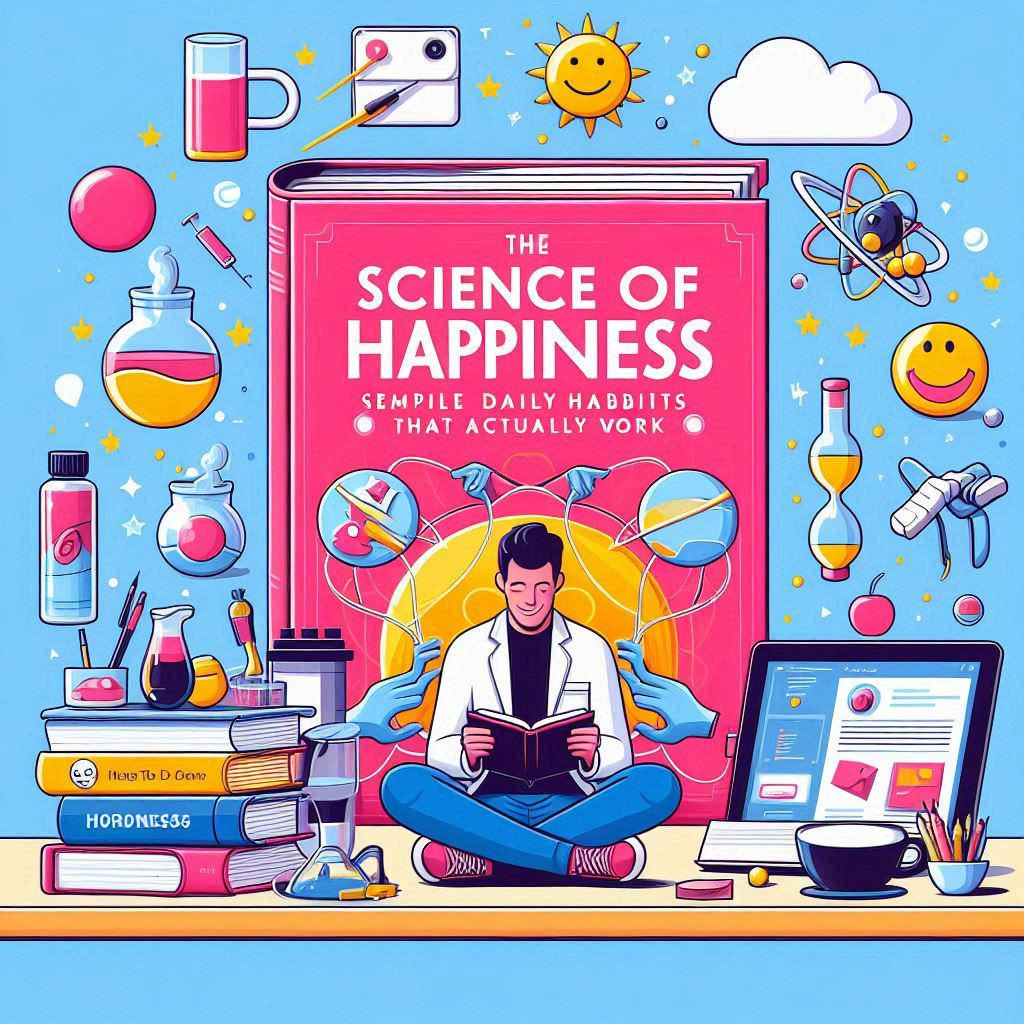The Science of Happiness: Simple Daily Habits That Actually Work

Meta Description :
Discover simple, science-backed habits to feel more joyful and grounded. A heartfelt journey through psychology and everyday wisdom.
Let’s be honest.
Happiness is something we all want—but often misunderstand.
We chase it through achievements, relationships, money, approval. We think, “Once I get that, then I’ll be happy.”
But here’s the twist: science says it doesn’t really work like that.
Real happiness—the kind that stays quietly in the background even on rough days—is built on small habits. Simple choices. Subtle shifts in how we think, feel, and show up in life.
This is not a list of magic tricks.
It’s a reflection of what I’ve learned—through reading, trying, failing, and gently trying again.
Let’s explore together.
1. Gratitude Isn’t Just Nice. It’s Neurology.
You’ve probably heard this before: “Be grateful.”
It sounds like advice printed on a mug. But neuroscience gives it real weight.
Studies from UC Davis and Harvard show that people who keep a simple gratitude journal—writing down three things they’re thankful for every day—report better sleep, stronger immune systems, and a deeper sense of joy.
Why?
Because gratitude trains the brain to scan for the positive.
When I started this habit, it felt forced. I wrote, “I’m grateful for coffee.”
Then the next day, “I’m grateful for my dog.”
Nothing profound.
But over time, something shifted.
I noticed little things more often. A smile. A good conversation. A sunset.
The moments didn’t change. I did.
2. Movement Is Medicine (Even If It’s Just a Walk)
We often think of exercise as something we have to do for our bodies.
But your brain loves it just as much—maybe more.
Even 10 minutes of walking increases serotonin and dopamine—your feel-good neurotransmitters.
I’m not a gym person. But taking quiet walks, especially in nature, does something almost sacred.
It clears the fog in my head.
It softens the tension in my chest.
It makes the world feel more alive—and me, part of it.
No need for fancy workouts.
Just move your body.
It’s a gentle way of saying to yourself: I’m still here. I still care.
3. Sleep: The Most Underrated Happiness Tool
This one surprised me.
Psychologist Matthew Walker calls sleep “the Swiss army knife of health.” But it’s also crucial for emotional regulation.
When we’re sleep-deprived, the amygdala (our fear center) becomes hyperactive—and our prefrontal cortex (the rational part) shuts down. That’s a recipe for mood swings and irritability.
I used to think I could sacrifice sleep for productivity.
Now, I protect it like gold.
8 hours isn’t laziness. It’s emotional hygiene.
And honestly, the world feels 40% more bearable after a good night’s rest.
4. Real Connection Beats Constant Stimulation
We’re more connected than ever—yet more lonely.
Research from Harvard’s 80-year-long study on adult development found that the quality of our relationships is the strongest predictor of long-term happiness. Not wealth. Not fame. Not IQ.
But here’s the catch: connection needs presence.
Not scrolling. Not multitasking.
But showing up. Asking “How are you?” and meaning it. Sitting with someone—even in silence.
I’ve learned to prioritize fewer, deeper conversations over more shallow ones.
Even just one real moment a day—where someone feels truly seen—can anchor you in joy.
5. Acts of Kindness Create a Ripple (Inside You, Too)
Doing something kind isn’t just good for others—it boosts your own well-being.
A study by Sonja Lyubomirsky found that performing 5 acts of kindness in a week significantly raises happiness levels. It could be as simple as sending a thoughtful message, holding the door, or paying for someone’s coffee.
There’s a beautiful quote:
“If you want others to be happy, practice compassion. If you want to be happy, practice compassion.” —Dalai Lama
Being kind reminds us that we’re part of something bigger.
And sometimes, the fastest way to lift your mood is to lift someone else’s.
6. Let Yourself Feel—Then Let Go
We often chase happiness by running away from discomfort.
But emotional avoidance doesn’t lead to peace. It leads to numbness.
Happiness isn’t about being cheerful all the time. It’s about feeling fully, and then finding your way back to center.
Therapist and author Susan David puts it beautifully:
“Discomfort is the price of admission to a meaningful life.”
I’ve learned not to resist sadness or anxiety. I try to meet them like visitors.
“Hello. I see you. You won’t stay forever.”
Oddly enough, letting feelings in helps them pass sooner.
And behind them, I often find stillness.
7. Purpose Doesn’t Have to Be Huge—Just Honest
You don’t need a grand mission.
Sometimes, meaning is found in the smallest things: growing a plant, writing a journal, showing up for your child.
Studies show that having a sense of purpose, no matter how modest, improves both physical and mental health.
My own purpose shifts and evolves. But it often begins with a simple question:
What is one thing today I can do with love?
That’s enough.
8. Mindfulness: Be Where Your Feet Are
You don’t need to sit cross-legged for an hour.
Mindfulness is just the practice of being here, now.
Even one mindful breath—truly noticing the inhale and exhale—can calm your nervous system.
When I’m washing dishes, I try to feel the water. When I’m eating, I try to really taste.
It sounds small, but it turns ordinary moments into little sanctuaries.
Because life isn’t lived in the past or the future.
It’s always happening right now.
Final Thoughts: Happiness Isn’t a Destination
If there’s one thing science, psychology, and real life all agree on, it’s this:
Happiness is not something you find.
It’s something you build.
Slowly. Gently. Daily.
Not through chasing more, but through noticing what’s already here.
So wherever you are, however you feel today—start small.
Take a walk. Say thank you. Breathe deeply. Be kind.
Let joy sneak in through the cracks.
Because often, the smallest things are what hold the most light.[*]
